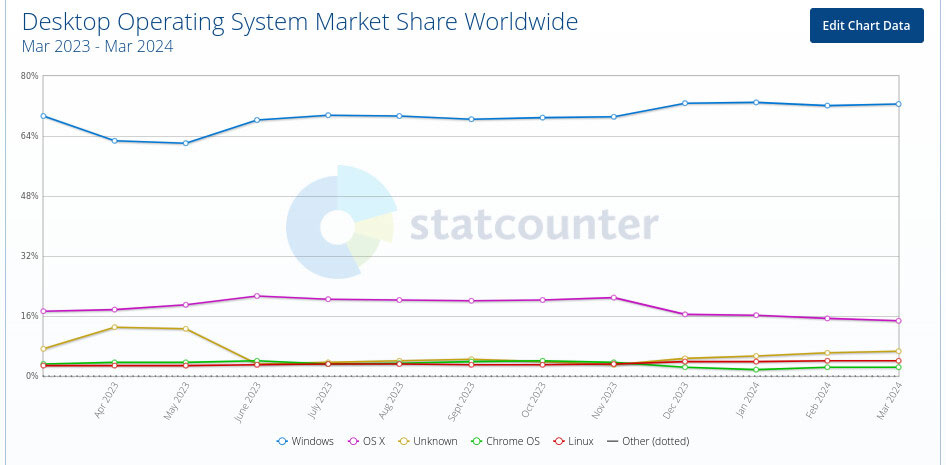4.05% of global computers are using Linux
Statistics website Statcounter has just officially released its monthly report, revealing the latest details about the market share of computer operating system versions globally in March, including Linux.
Previously in February, Linux surpassed the 4% market share mark for the first time, according to Statcounter. By March, the open source operating system platform continued to maintain 'slow but steady' growth with a market increase of 4.05%. An interesting note is that Statcounter does not include Chrome OS in the Linux market share, even though Google's operating system is essentially also using the Linux kernel. The data compiled for Linux includes 'pure' distributions such as Ubuntu, Fedora and Linux Mint.

Talking about Chrome OS, Google's operating system still had no change in market share at 2.27% in March. However, if considered more broadly, Chrome OS market share has actually decreased quite a lot since level 3. .89% last September.
The education sector is the main driver of Chrome OS as users just need to log in with their Gmail account and all their apps are there even on the new machine, as they all sync with Google Chrome. The setup process seems to be less 'headache-inducing' for both the student as well as the educational institution.
With Microsoft planning to retire Windows 10 in October 2025, many customers will have to decide whether to buy a new Windows 11 computer, or even try the open source operating system. For some people, this is not a simple choice. If you continue to run Windows 10, you can easily become a target for security attacks, while updating to Windows 11 requires an equivalent upgrade in compatible hardware. At that time, trying to experience Linux is not a bad idea.
It will be interesting to see how things play out after the Windows 10 shutdown. Let's see if Windows 11's strict hardware requirements backfire and hurt Microsoft's dominance of the desktop operating system market.
Next month, the open source community will receive two major Linux releases. First is Fedora 40 which comes with the latest GNOME desktop platform. A few days later, Ubuntu 24.04 LTS will also be available. The new Ubuntu version will have update support until 2029 - making sense for those who want to continue using existing hardware but can't upgrade to Windows 11.
 How to install and play GOG game on Linux
How to install and play GOG game on Linux Detection of new utility backdoor leaves many Linux distributions vulnerable to attacks
Detection of new utility backdoor leaves many Linux distributions vulnerable to attacks Should I upgrade to Ubuntu 24.04?
Should I upgrade to Ubuntu 24.04? How to create your own Caddy web server in Linux
How to create your own Caddy web server in Linux Canonical will support Ubuntu LTS releases for 12 years
Canonical will support Ubuntu LTS releases for 12 years 6 best Linux distributions for Windows users
6 best Linux distributions for Windows users